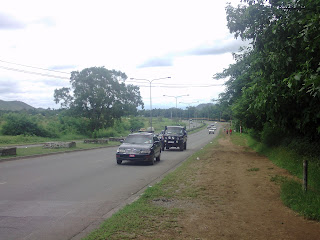We begin now serializing the novel, FINAL ISLANDS IN THE SUN, by Russell Soaba.
I will not come to you in
anger.
-Hosea: 11-9
Chapter 1
Tomwaya leaned over the driver’s
window to adjust the side mirror, so that traffic from behind him would be
visible enough for him to determine safe driving ahead. He was always conscious
of his fellow right-hand-drive motorists who had the habit of overtaking him on
the left, along the dirt track, an unconventional method observed by those in
too much of a hurry. Overtaking on the right would mean collisions with
on-coming traffic, especially at dangerously nonnegotiable bends and steep
recessions that rush up without warning at unwary drivers. In situations such
as this, the driver observing correct traffic rules would be the one in
trouble.
It was a long dirt road, this outback
highway, carved out, it seemed, of a rough terrain of hard abira rocks, crags
and abysmal precipices that could easily cause nausea even for well-experienced
motorists and travelers alike. It spanned thus, somewhat relentlessly and in
snaky twists and turns along the ridges of the Owen Stanley Ranges, from the
township of Alotau to Dogura, and further on to Cape Vogel. Tomwaya’s
passenger, traveling home to these parts of the Milne Bay Province from Port
Moresby City, asked how long it would take them to reach Awaiama. He assured
the passenger they would get there in a couple of hours.
“Would that be as far as you would want me
take you, sir?” Tomwaya then asked, carefully, as if weighing out possibilities
for further financial transactions with his client from the cities.
“Yes,” said the other, “if you can’t make
it as far as Dogura.”
“Parts of the road up that way are bad,”
warned Tomwaya, and changed the gears to ease the four-wheel drive down the
steepest slope his passenger had ever seen.
“I’ve seen the road from Goroka to
Kainantu,” said his passenger, “even those from Kundiawa to Hagen, and from
Goroka to Lae, but I have never seen anything as dangerously steep as this
one.”
“We get used to our highway, sir.”
“So, would that mean you would take me as
far as Wedau and Dogura?”
“You know,” said Tomwaya with a pleasant
sigh of feigned despair, “money these days speaks safely louder than dangerous
terrains like this one.”
“I have the money to cover the fare, if
that’s what you are saying.”
Tomwaya turned and eyed his passenger
questioningly.
“I do have the money,” said the passenger
finally, looking somewhat annoyed.
“All right, I’ll take you there,” said
Tomwaya, and they were down to level ground with the road dust free and
stretching far before them.
Tomwaya could feel better now, knowing that
the financial constraints on his business would be alleviated a little, as that
trip from Alotau to the outskirts of Dogura would mean his earning more than
five hundred kina that week. His fellow highway drivers along this route were
doing equally well, he was glad to see. But the number of clientele from the
cities was growing smaller each year as most travelers preferred dinghies and
chartered coastal vessels, which were cheaper. These city travelers traveled in
groups, or families of clans and tribes, and all thus shared boat fares at the
lowest that each could afford. Tomwaya, however, grew so excited about the
prospect of making good money that day that he drove on without any thought of
asking who his passenger really was.
When they reached Awaiama there was nothing
else to see except the bush and the long stretch of the highway. Occasionally a
few vendors appeared visible along the highway, but these were mere villagers
anxious to sell kulau, mangoes, pineapples, wild berries and assorted greens
and fruit nuts. They drove on without much conversation and when Tomwaya cast a
glance at his passenger the latter seemed too tired to concentrate on what lay
before them. He, the passenger, was busy nestling himself against the comfort
of a luxurious looking four-wheel drive, perhaps for a brief nap. It wasn’t
until they had driven out of Awaiama district and were making their way towards
Dogura that Tomwaya realized he needed more information on his client. But when
he turned from the wheel again to ask the necessary questions the latter was
fast asleep.








